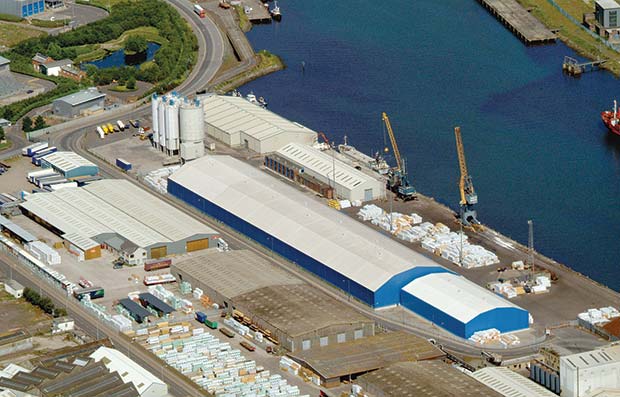The UK ports industry of about 120 commercial ports handles 95% of UK imports and exports. 365 days a year, 24 hours a day, these ports are active with the processing and storage of freight.
 Custom designed warehouses play a vital part in supporting the smooth operations of UK ports across the whole country.
Custom designed warehouses play a vital part in supporting the smooth operations of UK ports across the whole country.
More than 40 UK ports are owned and operated by nine main commercial companies which are members of the UK Major Ports Group. These include Associated British Ports, Belfast Harbour Commissioners, Bristol Port Company, DP World London Gateway, Forth Ports, Hutchison Ports UK, PD Port, Peel Ports and Port of London Authority. Their port activities account for more than 70% of the total tonnage handled in UK ports. Over the last 40 years, most of these ports have been supported by Rubb Buildings Ltd and supplied with a wide range of temporary and semi permanent structures to support the industry operations.
To support economic growth, UK ports process 500 million tonnes of freight per year and around 22 million international passengers. Rubb structures play a big part in making sure cargo is kept secure and protected from the elements.
Rubb port structures can be custom designed to meet a variety of bulk handling operations. Modular, temporary and semi-permanent fabric buildings are a cost effective alternative to traditional warehouses.
These design advantages allow Rubb structures to easily adapt to the changing requirements of the end user in a busy port environment.
Large clear spans and high translucent ceilings provide a bright, efficient working spaces. Rubb storage warehouses are built to UK building codes but are fully relocatable, extendable and moveable to meet changing needs.
Rubb structures have been supporting Forth Ports at the Port of Tilbury since 1990. With over 10 warehouses provided, Rubb has seen buildings, extended, relocated and reconfigured to suit the changing requirements of the ports end users. Rubb alternative storage solutions allow the port to react very quickly to customers’ requirements and construct covered warehouse facilities at very short notice. Ports and marine developments, which are often built on reclaimed land, can also be prone to differential settlement. Rubb fabric structures are not only lighter than traditional fixed buildings, they can accommodate this differential settlement.
RUBB BUILDINGS LTD




Comments are closed.